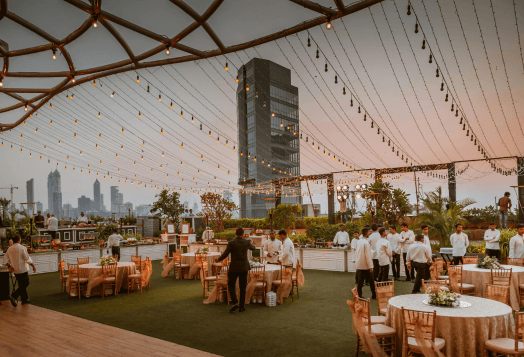Planning a wedding is often painted as a magical experience, but in reality, it’s a maze of choices, deadlines, and surprise costs. If you're wondering how to plan wedding celebrations without turning into a stress ball, you're not alone. This guide is your roadmap to calm, coordinated, and joyful wedding planning with insights into how expert help (like a wedding planner) can transform the journey.
The First Steps to Stress-Free Wedding Planning
Before you choose flowers or taste cake, it's time to build a strong foundation. These first steps are essential to successful wedding planning and help eliminate unnecessary stress later on.
1. Vision & Values

What do you want your wedding to feel like? Quiet and personal or lively and grand, like the vibrant celebrations described in planning an engagement party that feels effortless and looks expensive?Traditional rituals or a modern twist? Getting aligned on what matters most as a couple will shape every choice from venue to vows.
2. Budget Blueprint

Before the Pinterest boards get too exciting, map out a realistic budget. Include everything from venues to tiny details like favours. A planner can help you make the most of your money, avoid surprise costs, and ensure you stay on track and not stressed.
3. Guest List Groundwork

It doesn’t need to be final, but a rough guest count is key. It affects your venue, catering, and overall spend.
When your wedding planning list starts with clarity about your values, your money, and your people, every next step becomes easier. You’ll avoid backtracking, reduce overwhelm, and plan a day that actually feels like you.
A Practical Wedding Planning List to Guide Every Phase
Wondering how to plan wedding milestones and what needs to be done when? This phased wedding planning list breaks everything into bite-sized action points so you stay organised without the overwhelm.
Timeline | Key Tasks | Why It Matters |
12–18+ Months Out |
| Locks in top vendors early and sets the foundation for the rest of your planning |
9–12 Months Out |
| Keeps your momentum strong and ensures all major vendors are secured |
6–9 Months Out |
| Begins refining the look, feel, and logistics of your big day |
3–6 Months Out |
| Details come together, and celebration planning starts |
1–2 Months Out |
| Final prep ensures a smooth, stress-free countdown |
Final Week |
| The finish line is the time to breathe and trust the process |
By breaking your wedding planning list into clear, time-based phases, you’ll feel less overwhelmed and more in control, no matter how big or small your celebration. The key is to pace yourself, stay flexible, and focus on progress over perfection. And remember, you don’t have to do it all alone. Whether you need guidance from the start or support during crunch time, expert help is always just a step away.
Your Essential Indian Wedding Planning Checklist and Cultural Guide
Planning a desi wedding? This Indian wedding planning checklist covers the most important areas to keep in mind when organising your celebration, helping you honour your roots while staying grounded and organised.
1. Honour Cultural Traditions
Every Indian wedding is unique, but certain customs like selecting an auspicious muhurat, performing traditional rituals, or following regional ceremonies can be deeply significant to families. Taking time to research, understand, and intentionally include these elements ensures your wedding reflects your cultural identity with authenticity and meaning.
2. Plan Each Event Individually
Indian weddings are rarely a single-day affair. Events like the Mehendi, Sangeet, Haldi, Wedding Ceremony, and Reception each come with their own guest lists, themes, décor, and timelines. Planning each one individually helps you stay organised, ensures smooth transitions, and gives every moment the attention it deserves.
3. Book Culturally-Specific Vendors
From regional food menus to traditional décor and entertainment, working with vendors who are experienced in Indian weddings makes a world of difference. Whether it’s selecting the right mithai for gifting or hiring a dholwala for your baraat, culturally aligned vendors help bring your vision to life in a way that feels both festive and familiar.
4. Manage Big Guest Lists
Indian weddings often include extended family, family friends, and community members, resulting in larger-than-average guest counts. This affects everything from the venue size and catering volume to invitation tracking and transportation. Planning for scale early, as outlined in how to create the perfect guest list for your wedding invitations, helps reduce last-minute stress and ensures every guest feels welcomed and cared for.
5. Balance Family Expectations
Indian weddings are deeply family-driven, which often means multiple opinions, emotional investments, and involvement in the planning process. Setting clear roles, maintaining open communication, and aligning expectations early can help you preserve harmony and keep things running smoothly from start to finish.
Self Check QuizAre You Losing Yourself in the Planning? Answer Yes or No to the following:
If you answered “yes” to a few of these, you’re not alone |
Wedding planning can take a toll, but it doesn’t have to. When you bring in someone with experience, you create space to breathe, reset, and actually enjoy the moments that matter.
How to Plan Your Wedding and Actually Enjoy It
Beyond the checklists, maintaining your well-being throughout the process is paramount. Here are essential tips for "how to plan your wedding" without succumbing to stress, emphasising the strategic advantage of expert assistance:
Delegate Wisely
Don’t carry the entire load yourself. Hand off the heavy logistics to a wedding planner so you can focus on the parts you actually enjoy.Set Boundaries
It’s okay to say no. Protect your energy by setting limits with well-meaning family or friends. A planner can also step in as a buffer when needed.Prioritise Self-Care
Breathe. Move. Disconnect. With a professional handling the to-dos, you’ll finally have space to care for your body and mind.Communicate Openly
Keep conversations honest with your partner, vendors, and family. A planner acts as your communication HQ, reducing stress and misunderstandings.Embrace Imperfection
Things may not go exactly as planned, and that’s okay. A planner ensures hiccups are handled quietly, so you can stay in the moment.
Enjoy the Journey to ‘Happily Ever After’ with Your Wedding Planning List
Planning your big day should feel magical, not just manageable. With a thoughtful wedding planning list and attention to cultural details like those found in an Indian wedding planning checklist, you can stay organised, present, and joyful through every step.
But you don’t have to do it all yourself.
A professional wedding planner brings more than just structure; they bring calm, clarity, and confidence. From vendor coordination to last-minute problem-solving, their experience allows you to truly enjoy the journey.




